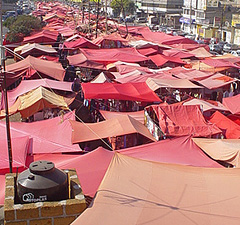 |
 |
 |
 News Around the Republic of Mexico | June 2007 News Around the Republic of Mexico | June 2007  
Mayor Sweeps Mexico City's Streets
 Jeremy Schwartz - Cox News Service Jeremy Schwartz - Cox News Service


| | According to the Mexico City daily newspaper Reforma, a handful of major leaders have divided up the historic downtown into virtual fiefdoms, charging a rent of about $5 per day for street and sidewalk space. |
Mexico City - Aztec warriors spotted an eagle holding a serpent in its mouth and, struck by the omen, founded the canal city of Tenochtitlan, precursor to the Mexican capital.

Seven hundred years later, the momentous location is hidden at the edge of a huge sea of street vendors. Tarps crowd sidewalks, techno music blares and customers squeeze through narrow openings in the chaos.

It's not just Mexico City's creation story that's swamped. Street sellers obscure a great swath of Mexico City's colonial history and finest baroque architecture - centuries-old churches, armories and museums.

But that may be about to change.

Six months into his term, Mexico City Mayor Marcelo Ebrard is embarking on an ambitious plan to rid downtown Mexico City of its legion of street vendors. The plan would tidy up the streets, and what some consider the most visible symptom of Mexico's dysfunctional economy.

"This is a huge monster, an iceberg," said Victor Cisneros, president of a group of established downtown merchants. "The street vendors are just the tip. The rest is below the surface - the corruption, the bootlegging . . . the politics."

As many as 60,000 street vendors crowd Mexico City's historic downtown, known as the Centro Historico. They sell everything from $10 jeans, pet turtles and photocopy machines to pirated DVDs and illegally imported Chinese knick-knacks.

Throughout Mexico City an estimated 500,000 street vendors account for 40 percent of economic activity, according to the city's Chamber of Commerce.

Nationwide, 19 million workers - 27 percent of the workforce - labor in a vast informal sector, paying no taxes and receiving few if any social services.

Potential tax revenue lost to street vendors represents 4 percent of the nation's gross domestic product, a study by Monterrey Technological University found. Street vendors peddling bootlegs have crippled Mexico's recording industry and stunted its movie industry.

Experts say the vendors, and the millions of migrants working in the United States, provide a safety valve for an economy that simply has not produced enough well-paying jobs.

THERE'S NO WORK

"Since I came here in 1970, I haven't been able to find a decent job," said Doroteo Moreno, who sells hand-knit sweaters and hats in front of the Mexico City Cathedral in the Zocalo. "There isn't any work. This is what I have to do to bring bread to my family."

But the street selling plays another, less altruistic, role in Mexican society.

Well-organized street vendors represent captive votes for city politicians, can be counted on to fill rallies and provide reliable campaign donations.

According to the Mexico City daily newspaper Reforma, a handful of major leaders have divided up the historic downtown into virtual fiefdoms, charging a rent of about $5 per day for street and sidewalk space. With tens of thousands of vendors, that translates into fantastic profits - and competition.

Ebrard's decision to move the vendors could set off political repercussions, observers warn. His Revolutionary Democratic Party (PRD) has historically been an unofficial supporter of street vendors since coming into power in 1997, trading votes for official indifference as vendors took over entire city blocks. Before that, vendors pledged their allegiance to the Institutional Revolutionary Party (PRI) when it controlled the capital.

"And if the PAN (the conservative National Action Party of President Felipe Calderon) comes to power then we'll all be PANistas," explains Malena Acuna, who controls an estimated 500 vendors in the area surrounding Mexico's Supreme Court.

RUIN OR RESCUE?

Mexico City is touting its current operation as a "rescue" of the historic downtown. It is part of a larger $40 million plan to renovate aging streets. Business groups are pushing for the government to build a megamarket to house the street sellers, a proposal that vendors largely reject.

"We are willing to come to agreements, but what is not negotiable is that there is law on the books that prohibits commerce in the public way in the Centro Historico," Ebrard has said. "This is not subject to the whims of [the vendor leaders]."

Moving the vendors out of downtown Mexico City may prove harder than officials imagine. Past attempts have failed miserably. Of 28 indoor markets built in the 1990s to house street vendors, only four have been successful, the rest have been abandoned or used to store goods sold on the street.

Vendors say they won't leave.

"There's too many of us," said a 26-year-old seller of pirated DVDs, who didn't want to be identified because he makes his living illegally. The man said that if authorities run off the street vendors, many would be forced to turn to violent crime. "It would be one thing if they said, 'OK here's a job.' But just to kick us out without anything to feed our kids? Crime will go way up." | 
 | |
 |



